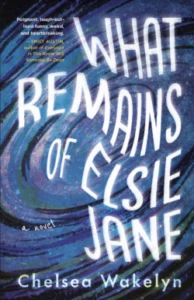1850 ‘The realities of human mourning’
What Remains of Elsie Jane
by Chelsea Wakelyn
Toronto, ON: Dundurn Press, 2023
$24.99 / 9781459750845
Review by Rhea Tregebov
*
 “We witness and absorb the subjective sensory patterns of those we love, just by virtue of spending time with them. And when they’re gone, even when they’re gone for good, a part of them stays within us. Our brains are love sponges, basically, soaking up the essences of our beloveds such that in their absence, we really can feel what they would be feeling, think what they would think.” —What Remains of Elsie Jane
“We witness and absorb the subjective sensory patterns of those we love, just by virtue of spending time with them. And when they’re gone, even when they’re gone for good, a part of them stays within us. Our brains are love sponges, basically, soaking up the essences of our beloveds such that in their absence, we really can feel what they would be feeling, think what they would think.” —What Remains of Elsie Jane
Elsie Jane, the first-person narrator and protagonist of Chelsea Wakelyn‘s What Remains of Elsie Jane, is struggling to hold on to Sam, her beloved partner, in the wake of his death. Much of the novel is centred around her attempts to have Sam stay within her, to feel what he would be feeling, think what he would think. Elsie also grapples with understanding the circumstances around his unexpected and early death. Wise-cracking, smart, raw and achingly funny, Elsie’s voice is central to the novel. But central too is Sam, whose voice not only interrupts Elsie’s thoughts, but is powerfully represented in the emails that Elsie compulsively reads and re-reads during sleepless nights.
In the obituary Elsie writes for Sam, he’s described as a devoted father and partner, a brilliant mind whose accomplishments as a computer scientist are being applied to a PhD on artificial intelligence and metacognition in computation. Sam is depicted as not only deeply loved and loving, but as profoundly interesting, a man whose energy and enthusiasm for life were contagious. Sam’s emails vividly reveal the depth of the couple’s love for each other and make us ache for Elsie and her loss.
Here’s a message from Sam in their early courting days:
“It’s not victory I’m looking for, in this. It’s intimacy. I want to be as near to you as possible, as close as possible, but only if you want that, too. Do you, darling? I can go there, to that level of intimacy, but only if you want to. Only if you go there, too.
I want more, with you, than I’ve ever wanted with anybody. I want to eat the world with you, and I know it’s possible.”
This is Wakelyn’s first book, and she demonstrates an astounding talent for combining comedy with tragedy. In this aspect, Wakelyn shares many of Miriam Toews’ extraordinary gifts. What a largeness of soul one must have to encompass this perspective. It is a huge strength in the novel, as is the author’s ability to keep her story propulsive and her readers engaged.
Wakelyn’s initial portrait of Sam in all his immense charm and compelling complexity is so convincing that when Elsie’s irritating, self-righteous neighbour refers to Sam’s alcoholism, readers may dismiss the allegation as the neighbour’s invention. But slowly, painfully, the loving picture of a loving man begins to show the cracks that led to his death from drug poisoning.
We’ve all read the headlines. In April 2023, BC’s Chief coroner Lisa Lapointe called the drug poisoning death toll “a crisis of incomprehensible scale.” We’ve had 11,807 people die since April 14, 2016, when the longest public-health emergency in our province’s history was first declared. In March 2023, roughly 6.4 people died of drug poisoning in our province every day. While we do know that these are individual and genuine losses, we may also have a self-protective tendency to see the deaths as inevitable, to view those who died as living so close to the edge that their lives could not have continued. Wakelyn makes Sam Sorenson so alive, so real and valued and valuable, that his death is seen, as all these deaths must be, as complete loss, completely unnecessary.

It was devastating to learn that Wakelyn’s story is drawn from her own biography. Wakelyn did indeed lose her partner under similar circumstances to the protagonist. (Ironically, since Wakelyn’s real-life partner died on December 7, 2015, he would not be one among the count of 11,807.) While the biographical origins of the novel clearly contribute to its power and authenticity, there are also biographical echoes that are perhaps unnecessary to the story. The book opens with the obituary for Sam, which mentions an older child from a previous relationship, a detail that reflects the author’s partner’s own family. Other than a brief note, this fictional child plays no part in the novel. A bit of pruning here would likely have been a wise editorial choice. The novel is, however, so dynamic that it seems churlish to critique.
Wakelyn doesn’t spare her protagonist in the depiction of Elsie’s all too human faults, the selfishness of her grief, the keen yearning that sends her quickly into seeking solace with other men. There are a few cringe-worthy moments that reflect badly on Elsie. Even so, painting her as a suffering saint and martyr would have been far less accurate, and far less respectful of the realities of human mourning.
Wakelyn unstintingly shows us Elsie’s struggles to look after her two children, and the story acknowledges Elsie’s emotional withdrawal and absence. Absent too from the narrative is any sense of the children’s own loss of a loving father and stepfather, particularly in the older child, Lark, who would clearly be suffering as well. The comparison may be unfair, but Toews’ ability to portray a child’s world in many of her novels adds to the psychological richness she creates.
As Wakelyn’s novel draws to a close and Elsie begins to regain some more stable footing, we see more of the children and Elsie’s connection to them. Perhaps it would be asking too much of Wakelyn’s story to encompass sorrow upon sorrow. This book remains a compelling and moving tale and an accomplished debut.
*
 Rhea Tregebov is an award-winning poet and the celebrated author of five children’s picture books as well as two novels, Rue des Rosiers (2019) and The Knife Sharpener’s Bell (2009). She lives and writes in Vancouver, where she is Associate Professor Emerita at the School of Creative Writing at UBC. She served as Chair of the Writers’ Union of Canada from 2021 to 2023. She is currently completing her eighth collection of poetry, which will be published by Véhicule Press in Spring 2024. Rue des Rosiers was reviewed in BCR by Paul Hendrick.
Rhea Tregebov is an award-winning poet and the celebrated author of five children’s picture books as well as two novels, Rue des Rosiers (2019) and The Knife Sharpener’s Bell (2009). She lives and writes in Vancouver, where she is Associate Professor Emerita at the School of Creative Writing at UBC. She served as Chair of the Writers’ Union of Canada from 2021 to 2023. She is currently completing her eighth collection of poetry, which will be published by Véhicule Press in Spring 2024. Rue des Rosiers was reviewed in BCR by Paul Hendrick.
*
The British Columbia Review
Interim Editors, 2023-24: Trevor Marc Hughes (non-fiction), Brett Josef Grubisic (fiction)
Publisher: Richard Mackie
Formerly The Ormsby Review, The British Columbia Review is an on-line book review and journal service for BC writers and readers. The Advisory Board now consists of Jean Barman, Wade Davis, Robin Fisher, Barry Gough, Hugh Johnston, Kathy Mezei, Patricia Roy, Maria Tippett, and Graeme Wynn. Provincial Government Patron (since September 2018): Creative BC. Honorary Patron: Yosef Wosk. Scholarly Patron: SFU Graduate Liberal Studies. The British Columbia Review was founded in 2016 by Richard Mackie and Alan Twigg.
“Only connect.” – E.M. Forster































One comment on “1850 ‘The realities of human mourning’”